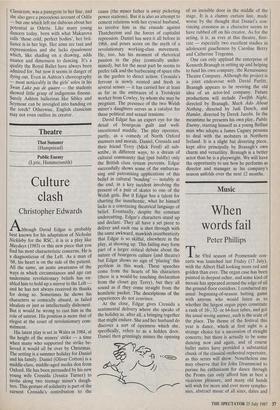Theatre
That Summer (Hampstead) Public Enemy
(Lyric, Hammersmith)
Culture clash
Christopher Edwards
Although David Edgar is probably best known for his adaptation of Nicholas Nickleby for the RSC, it is in a play like Maydays (1983) or this new piece that you find his most characteristic concerns. He is a diagnostician of the Left. As a man of '68, his heart is on the side of the patient. All the same, an acute awareness of the ways in which circumstances and age can undermine revolutionary beliefs has en- abled him to hold up a mirror to the Left and he has not always received its thanks for doing so. Sometimes he shows his characters as comically absurd, as failed idealists or just as intellectually dishonest. But it would be wrong to cast him in the role of satirist. His position is more that of elegist at the court of revolutionary com- mitment.
His latest play is set in Wales in 1984, at the height of the miners' strike — a time when many who supported the strike be- lieved it would all be over by Christmas. The setting is a summer holiday for Daniel and his family. Daniel (Oliver Cotton) is a middle-class, middle-aged media don from Oxford. He has been persuaded by his new young wife Cressida (Jessica Turner) to invite along two teenage miner's daugh- ters. This gesture of solidarity is part of the earnest Cressida's contribution to the cause (the miner father is away picketing power stations). But it is also an attempt to cement relations with her cynical husband, to involve him in the crusade against Thatcherism and the forces of capitalist repression. Daniel has seen it all before in 1968, and pours scorn on the myth of a revolutionary working-class movement. He, too, has his moment of rhetorical passion in the play (comically under- mined), but for the most part he seems to prefer talk and the barbecuing of spare ribs in the garden to direct action. Cressida's fervour is newly minted and fresh in several senses — it has carried her at least as far as the embraces of a Trotskyist worker from Cowley, by whom she may be pregnant. The presence of the two Welsh miner's daughters serves as a catalyst for these political and sexual tensions.
David Edgar has an expert eye for the detail of bourgeois guilt and well- intentioned muddle. The play operates, partly, as a comedy of North Oxford manners and morals. Daniel, Cressida and their friend Terry (Mick Ford) all sub- scribe, in different ways, to a dream of cultural community that (put baldly) only the British class system prevents. Edgar successfully shows some of the embarras- sing and patronising applications of this belief in cultural 'bonding' — notably at the end, in a key incident involving the present of a pair of skates to one of the Welsh girls. But if Edgar has a talent for charting the inauthentic, what he himself lacks is a convincing theatrical language of belief. Eventually, despite the constant undercutting, Edgar's characters stand up and declare. They all have a set piece to deliver and each one is shot through with the same awkward, mawkish inauthenticity that Edgar is so skilful, elsewhere in the play, at showing up. This failing may form part of a larger critical debate about the nature of bourgeois culture (and theatre) but Edgar shows no sign of 'placing' this problem in this work. These speeches come from the hearts of his characters (there is a would-be touching declaration from the closet gay Terry), but they all sound as if they come straight from the homiletic packet. The descriptions of the experiences do not convince.
At the close, Edgar gives Cressida a sentimental delivery where she speaks of the holiday as, after all, a bringing together that might endure. She and her husband do discover a sort of openness which she, specifically, refers to as a hidden door. Daniel then grinningly mimes the opening of an invisible door in the middle of the stage. It is a clumsy curtain line, made worse by the thought that Daniel's con- vincing crassness as a character seems to have rubbed off on his creator. As for the acting, it is, as ever at this theatre, first- rate — especially two excellent studies in adolescent gaucheness by Caroline Berry and Catherine Tregenna, One can only applaud the enterprise of Kenneth Branagh in setting up and helping to fund his own company, the Renaissance Theatre Company. Although the project is a joint endeavour with David Parfitt, Branagh appears to be reviving the old idea of an actor-led company. Future productions will include Twelfth Night, directed by Branagh, Much Ado About Nothing, directed by Judi Dench, and Hamlet, directed by Derek Jacobi. In the meantime he presents his own play, Public Enemy, starring himself as a young Belfast man who adopts a James Cagney persona to deal with the mobsters in Northern Ireland. It is a slight but diverting piece, kept alive principally by Branagh's own charm and versatility. Branagh is a better actor than he is a playwright. We will have the opportunity to see how he performs as director and manager as his company's season unfolds over the next 12 months.


















































 Previous page
Previous page